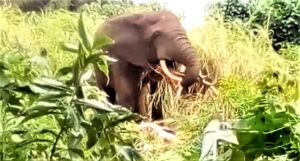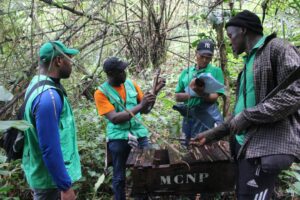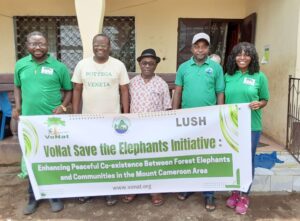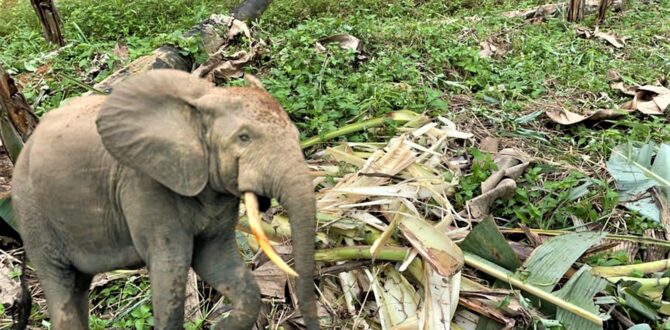By Ndimuh B. Shancho
________________________
The world’s largest land mammal, Africa forest elephant (Loxodontacyclotis), classified as critically endangered on the International Union for the Conservation of Nature (IUCN) Red List is at daggers drawn with communities in the West Coast Cluster Conservation Zone of the Mount Cameroon National Park. The Mount Cameroon National Park is a 58,154-hectare IUCN Category II protected area created by the Cameroon Government in 2009. It lies on the coast in the Gulf of Guinea, with an altitude of about 4,100 meters above sea level, the highest mountain in West and Central Africa, and remains one of the most important and threatened centres of biodiversity and endemism in Cameroon and Africa.
Origin of Conflict
Forest elephant population increased from 170 in 2009 to 300 in 2019, while the population of its 41 adjacent communities has increased exponentially within same period, due to the rich volcanic soils, educational facilities, and most recently, the arm conflict that has rendered other parts of North West and South West Cameroon unsecured. This has induced competition for the same land, with elephants spotted in the communities every now and then.

Farmers, who depend entirely on farming for their livelihoods, work extremely hard all year long growing crops to meet up with the ever-increasing family exigencies and livelihoods needs only to lose all to the elephants. Che Linus, an Internally Displaced Person (IDP), in Bankingili lost all he labored for on August 19, 2023 to the elephants. “I came here as an IDP. I planted 800 plantain suckers, 200 yams and cocoyam, and 50 meter square of watermelon but elephants have destroyed all. I am frustrated! Let them kill some of these elephants. We are tired,” Mr. Che laments.
While this has caused some farmers to abandon their farms in search of alternative livelihood sources, others have no option than to keep “fighting” with the elephants. “The conflict is still on. Elephants now sleep behind our schools. The whole community is affected as a vast majority of our population depend on farming,” said the West Coast Cluster Chairman, Mr. Nche Thomas Njungu Elive.
Government, Conservation Organizations Step In!
According to the South West Regional Delegate of the Ministry of Forestry and Wildlife (MINFOF-SW), Delphine Ikome, the Cameroon Government has been actively engaged in resolving the human-elephant conflict in the West Coast Cluster of the Mount Cameroon National Park. “Scary missions have been organized, beehive fencing and chilli pepper fencing established, but this has not stopped the elephants from leaving the park into the communities,” the MINFOF-SW boss said.

Madam Ikome explained that her Ministry has been engaged in continuous sensitization and monitoring to avoid farmers from encroaching into the park, and has, through the Programme Sustainable Management of Natural Resources (PSMNR)-South West Region, provided affected communities with alternative sources of livelihood support. “We have assisted the community with the establishment of multipurpose community nurseries to generate revenue, provided improved Cassava cuttings to farmers for increased yields, provided them with timber and non-timber forest products to plant in their farms and community forests. Some communities have benefited from cassava transformation units, with plans of a storage facility underway,” she added. Beside these, the Ministry has installed 100 beehives along the Park border with the aim of limiting elephant incursion.

Apart from the Government and partners, some conservation non-profit organizations are carrying out different actions to complement Government’s actions at mitigating this conflict. One of such organizations is Voice of Nature (VoNat). VoNat recently launched its “Save the Elephants Initiative” that aims to establish an eco-friendly system that will contribute to enhancing the peaceful co-existence of the African forest elephant with adjacent communities of the Mount Cameroon National Park, most especially in the West Coast Cluster.

In the first phase of the initiative, implemented with funding support from Lush Charity, the organization collaborated with the Mount Cameroon National Park Service to monitor and evaluate the status of 100 hives earlier installed at the Park border to limit elephant incursion into the community. VoNat has since leveraged the result of the monitoring and evaluation exercise to rebait over 76 bee hives along the West Coast Cluster of the Park to enhance their colonization rate, as a means of limiting elephant incursion into the community that often lead to conflict. The organization recently produced five new bee hives to reinforce the bee hives earlier installed along the West Coast Cluster as a human-elephant conflict mitigation tool.

Beside evaluating and supporting bee hives installation to resolve the conflict, VoNat is carrying out conservation education in schools to neutralize the ardent hate and negative perception of elephants by Mount Cameroon adjacent communities including kids and youths, who hold the key to the future sustainability of the species in the area. The organization believes that education and sensitization can be successful in changing the negative attitudes of communities of the West Coast Cluster conservation zone of the Mount Cameroon towards elephants conservation, and getting them engaged in conservation efforts.
West Coast Communities’ Grievances
Even as the Cameroon Ministry of Forestry and Wildlife through its Regional Delegation and the Mount Cameroon Park Service, alongside other conservation organizations make efforts to mitigate the human-elephant conflict, some community members are still not satisfied. “Villagers do not want to hear anyone talk to them about elephants. Anything related to conservation, sensitization or coexistence is out of question! They have listened to these for the past 5 years, but nothing has changed,” said the West Coast Cluster Chairman, Mr. Nche Thomas Njungu Elive.

“We have tried chilli Pepper, scaring mission and others with the Park but the elephants keep coming. The Park and MINFOF-SW should respect the Prime Ministerial Decision and kill two of these elephants,” he added. Denizens of the West Coast Cluster of the Mount Cameroon National Park believe that the only thing that can scare elephants from their communities is the blood of their counterpart.
MINFOF-SW Responds
The South West regional Delegate in the Cameroon Ministry of Forestry and Wildlife, Delphine Ikome says, all attempts for the implementation of the said Decision have been abortive. “When the decree came, we informed the community about it and had to collaborate with some community members, forces of law and order and an expert to do the killing. We went to the field on several occasions, but couldn’t meet the elephants since they do not just stay on one corridor. So, we decided to suspend the implementation and start working towards the ‘Safe Approach’ for communities to cohabit with the elephants. The result of this will be made public soon,” she stated.
Elephant are a key architect in the regeneration of the forest which serves as a carbon sink and is very instrumental in fighting climate change, one of the world’s most dreadful crises. Beside these, elephants play a crucial role in improving the conditions of other species in the forest. Given the importance, which this species has on the ecosystem, many conservation experts see co-existence as the best way out of the conflict but villagers still wonder how possible this can be.







